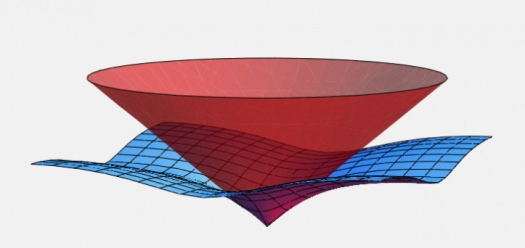

We don’t want to alarm you, but there’s a distinct possibility that our universe is nothing more than a huge computer simulation, that we’re all living in The Matrix, and none of this is real. But while stopping short of full-on human-machine warfare, a team of interested researchers at the University of Bonn is trying to see just how deep the rabbit hole goes by performing a measurement that should tell us if we’re stuck in a computer simulation.
This notion is based on quantum chromodynamics, which is the idea that describes how the strong nuclear force binds quarks and gluons together into protons and neutrons–and thus binds everything else together. We’re talking about very fundamental physics here, the process by which elementary particles form larger particles which form larger particles which form life, the universe, and everything.
Researchers have long sought to model quantum chromodynamics on supercomputers, but the problem is that these kinds of simulations take place at such a small scale and are so dazzlingly complicated that even the biggest supercomputers can only simulate an extremely small swath of our infinitely massive universe–something just a few femtometers across (a femtometer is one million nanometers, which is still really, really small).
But, such a simulation is also so elementary, so very fundamental to the construction of the universe, that it is basically a simulation of the universe itself. Which leads us to the question: how can we know that we are not living inside this very kind of simulation? (Spoon bends, mirror turns to liquid, mind blows, etc.).
Silas Beane and some colleagues at the University of Bonn think they’ve come up with a way to measure the universe in such a way that we can know if we’re living in a giant sim. This is all based on a value known as the Greisen-Zatsepin-Kuzmin cut off, or GZK. In the world of theoretical physics, things can more or less be limitless, but in computers things have to have limits. This is one of the problems with these kinds of simulations; the laws of physics have to be placed in a constrained, 3-D space–a lattice–that is limited by the nature of the computer sim.
Beane and his colleagues are exploring whether or not these lattices alter the physical processes we have observed in the universe. Specifically, they are looking at high energy processes, which get smaller and smaller the more energetic they become. Beane and company have found that these 3-D lattices impose a limit on the amount of energy these processes can have, because nothing occurring within the sim can be smaller than the lattice itself. So, if we are living inside of a computer program, there should be a fundamental limit within the spectrum of high energy particles, like cosmic ray particles.
And there is. That’s the GZK cut off. It’s well-studied and well-defined, and occurs because over time and distance cosmic ray particles interact with the cosmic microwave background and lose energy. So, if Beane and his friends are correct, we can measure cosmic ray particles–using existing technology–to see if they behave in the way theoretical physics says they should, or if they behave as we might expect them to in a computer simulation. If we found that the cosmic waves behave in a particular way, we would basically be able to see the construction of the simulation lattice–and confirm that we are indeed living in a computer simulation.
Of course, this exercise only works if our robotic overseers built their simulation the same way we would. Then again, they would, wouldn’t they? After all, we created the robots in our image, and the robots created The Program. Possibly. If our sentient robotic conquerers built their Matrix differently than Beane and company predict, or at a vastly smaller scale, we still won’t see the simulation around us, and we’ll continue to go on about our insignificant simulated lives blissfully unaware.
